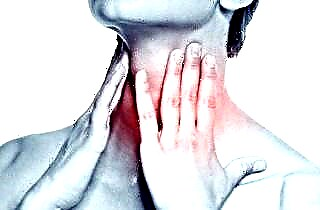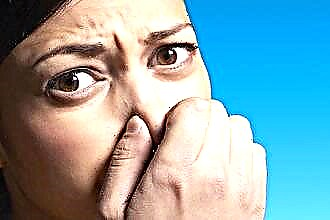A sore throat is often sudden and severe enough to disrupt the normal rhythm of life. Even if it is not accompanied by a high temperature, it can still be completely unsettled. It interferes with eating normally, communicating and even sleeping, provoking a cough, and in the absence of treatment, it becomes stronger over time. Throat medications come in many different forms, but the most popular of these is syrup.
Sore throat causes
 Syrup does not always help for a sore throat. After all, it can arise for a variety of reasons, not only because of a cold or the ingestion of pathogens in the respiratory tract. Although in 90% of cases, a sore throat in adults indicates the onset of acute respiratory infections, acute respiratory viral infections, tonsillitis or inflammation of the larynx: pharyngitis or laryngitis.
Syrup does not always help for a sore throat. After all, it can arise for a variety of reasons, not only because of a cold or the ingestion of pathogens in the respiratory tract. Although in 90% of cases, a sore throat in adults indicates the onset of acute respiratory infections, acute respiratory viral infections, tonsillitis or inflammation of the larynx: pharyngitis or laryngitis.
The infectious nature of these diseases is signaled by a sharp rise in temperature, sometimes above 39OC, which can only be brought down for a short time and severe redness of the tonsils and / or the back wall of the larynx. With tonsillitis, a characteristic white bloom or multiple abscesses forms on the tonsils. There is a burning sensation, perspiration, and a dry barking cough is often present. With acute respiratory infections and acute respiratory viral infections, in addition, snot flows abundantly.
But you shouldn't make your own diagnoses. Even with all of the above symptoms, you may not have ARVI, but a much more serious disease: scarlet fever, measles, etc., which requires immediate complex treatment. And taking only cough syrup is just wasting time and allowing the infection to penetrate deeper into your respiratory tract.
Non-infectious causes of sore throat can be both harmless enough and very serious, requiring urgent action:
- Severe irritation. May be caused by polluted air, smoke, unpleasant odors, poisonous fumes, chemicals, food that is too spicy or hot. Anything that can damage the delicate mucous membranes of the throat causes painful sensations, since the nerve endings in this area are very sensitive.
- Overstrain of the ligaments. Perhaps with a prolonged or too loud conversation, technically incorrect singing, screaming, bouts of dry barking cough. Constant overexertion can lead to partial or complete loss of voice and the formation of nodes in the ligaments.
- Allergic reaction. It is always accompanied by redness and swelling of the mucous membranes, which can cause unpleasant painful sensations. Allergens often provoke attacks of severe coughing, and may remain undetected for a long time.
- Chronic sinusitis and rhinitis. They are accompanied by copious secretions of mucus, often purulent, which flows into the throat, especially when the body is horizontal, accumulates there and irritates the nerve endings, provoking inflammation and coughing.
 Reflux disease. This is the non-closure of the reflux valve that separates the stomach cavity from the esophagus. Periodically, gastric juice and stomach contents are thrown into the esophagus, which causes heartburn and severe irritation of the mucous membranes. With acidic belching, the secretion enters the throat and causes a burning sensation and pain.
Reflux disease. This is the non-closure of the reflux valve that separates the stomach cavity from the esophagus. Periodically, gastric juice and stomach contents are thrown into the esophagus, which causes heartburn and severe irritation of the mucous membranes. With acidic belching, the secretion enters the throat and causes a burning sensation and pain.- Air is too dry. Especially in a room in which a person is for a long time: working or sleeping. The mucous membranes gradually dry up, and if a person is in such conditions from day to day, they atrophy and can no longer perform high-quality protective functions.
- Stomatitis and other infections in the mouth. If left untreated, the ulcers can spread further and affect the back of the larynx. Chronic mouth infections are often the first symptom of HIV.
- Neoplasms: polyps, cysts, tumors, including malignant ones. At an early stage or due to the peculiarities of their location, they may not be visually noticed. Indirect signs can be: a feeling of the constant presence of something outsider inside, increased pain when swallowing, eating, traces of blood in saliva or coughing up sputum.
In principle, for any reason for a sore throat, you can choose a drug that will significantly alleviate the condition. But in most cases, the effect of such treatment will be short-lived - until the influence of external and internal stimuli is eliminated, the throat will not stop hurting.
Therefore, for a start, it is worth excluding all household reasons and quitting smoking. If the sore throat does not go away within a few days or other unpleasant symptoms that indicate the infectious nature of the disease join it, it is necessary to undergo a diagnostic examination.
Alarming symptoms
There are a number of alarming symptoms, with the appearance of which it is better not to delay the visit to the doctor and certainly not try to get rid of them yourself with the help of syrups and alternative methods of treatment:
 consistently high body temperature - from 39OFrom and above, which gets lost only for a short time;
consistently high body temperature - from 39OFrom and above, which gets lost only for a short time;- hoarseness, hoarseness of voice, partial or complete loss of it;
- strong wheezing that can be heard even without a stethoscope;
- yellow-green clots with an unpleasant odor in the coughing up mucus;
- streaks of blood in saliva, coughing up clots of clotted blood;
- inflammation, soreness and enlargement of the lymph nodes;
- sharp pain while eating and drinking, decreased appetite;
- shortness of breath, severe swelling of the throat;
- symptoms of general intoxication of the body: weakness, nausea, vomiting, dizziness.
Such symptoms require immediate medical attention and, most likely, you will have to take antibacterial drugs, which the doctor should prescribe.
Sometimes antibiotics are prescribed even before all the test results are available in order to avoid the development of serious complications and the rapid progress of the disease.
Best syrups
 The choice of throat syrups in modern pharmacies is so large that it is not surprising to get lost in them. Few people know that even expectorants have different mechanisms of action and in no case should they be used with antitussive drugs. Therefore, even finding out the cause of the cough is often not enough.
The choice of throat syrups in modern pharmacies is so large that it is not surprising to get lost in them. Few people know that even expectorants have different mechanisms of action and in no case should they be used with antitussive drugs. Therefore, even finding out the cause of the cough is often not enough.
The doctor, when choosing a medicine, takes into account the nature of the cough, the frequency of attacks, the presence and consistency of sputum. Improper prescription or self-use of inappropriate drugs can lead to increased coughing attacks, swelling, allergic reactions and even internal bleeding.
The following syrups have proven themselves best in the treatment of pain and sore throat:
- "Doctor IOM". The syrup is made on a natural basis and contains extracts of 11 medicinal plants. But it also contains a number of chemical components that significantly increase its effectiveness. Gives good results in the treatment of bronchitis, laryngotracheitis, pharyngitis. It has anti-inflammatory, expectorant, mucolytic properties.
- Bromhexine. A potent mucolytic drug that dilates the bronchi, making it easier to breathe and remove phlegm. It is sold without a prescription, but it is advisable not to use it without a doctor's prescription. Has a number of contraindications.
- "Licorice syrup". Licorice root has anti-inflammatory and bactericidal properties, due to which it copes well with infectious and non-infectious sore throats: pharyngitis, tracheitis, tonsillitis. Promotes liquefaction and discharge of phlegm in bronchitis, quickly restores damaged mucous membranes.
- Chlorophyllipt. The drug is based on eucalyptus leaves and has strong antibacterial and anti-inflammatory properties.Treatment with an oil solution quickly relieves pain and redness in the throat. Can be taken orally (previously diluted with water) - it relieves coughing attacks and promotes the excretion of phlegm.
 "Fluditek". An effective mucolytic drug that increases bronchial secretion while decreasing the viscosity of the secretions. Quickly converts an unproductive cough into a productive cough. With a large amount of sputum, it is not prescribed. It helps well with tracheitis and bronchitis.
"Fluditek". An effective mucolytic drug that increases bronchial secretion while decreasing the viscosity of the secretions. Quickly converts an unproductive cough into a productive cough. With a large amount of sputum, it is not prescribed. It helps well with tracheitis and bronchitis.- "Sinekod". An effective combination remedy to relieve dry barking coughs that cause sore throat. At the same time, it suppresses the cough reflex and reduces the viscosity of sputum. It is used to treat the initial stage of most respiratory diseases.
- "Lazolvan". Effective expectorant. Facilitates breathing, softens cough, promotes phlegm excretion. Helps to quickly get rid of dry, unproductive cough.
During treatment, the dosage must be strictly observed. Many people think that cough syrup is not a medicine, so it can be drunk with every coughing fit. But overdose often leads to unwanted side effects and allergic reactions.
It is important to remember that no throat syrup, even the best, will cure a trapped infection. Therefore, if, according to the results of the examination, the doctor prescribed antibiotics, they must be taken. Otherwise, the development of serious complications cannot be avoided, in comparison with which a sore throat will seem a trifle.
How else to help your throat
The use of syrups alone is not enough to quickly get rid of a sore throat and restore damaged mucous membranes. The problem must be addressed in a comprehensive manner, while using a number of measures at the same time:
- Maximum rest. In severe cases of the disease - to the whole body, observing bed rest during the acute period. With overstrain of the ligaments, sore throat, laryngotracheitis, pharyngitis - throat, trying to talk as little as possible.
- Warmly. Nothing harms a sore throat like hypothermia. Therefore, it is advisable to wrap a warm scarf around your neck, stay away from a working air conditioner or an open window, and exclude cold food and drinks from the diet.
 Drink plenty of fluids. Ideally, herbal teas with pronounced antiseptic or anti-inflammatory properties: linden, chamomile, raspberry, currant, rosehip decoction. Drink at least 2 liters of water per day.
Drink plenty of fluids. Ideally, herbal teas with pronounced antiseptic or anti-inflammatory properties: linden, chamomile, raspberry, currant, rosehip decoction. Drink at least 2 liters of water per day.- Inhalation. For diseases of the upper respiratory tract in adults, steam with a soda solution, essential oils, a decoction of eucalyptus or sage are most effective. For pneumonia and bronchitis, the best choice is a nebulizer, which converts the drug into a finely dispersed solution and delivers it to the lower respiratory tract.
- Warming up. A mustard plaster placed on the back of the neck can quickly relieve colds and viral sore throats. If the inflammation is not purulent, then paraffin, a blue lamp, a bag of warm sand or salt can be used. Or travel to the clinic for physiotherapy procedures.

 Reflux disease. This is the non-closure of the reflux valve that separates the stomach cavity from the esophagus. Periodically, gastric juice and stomach contents are thrown into the esophagus, which causes heartburn and severe irritation of the mucous membranes. With acidic belching, the secretion enters the throat and causes a burning sensation and pain.
Reflux disease. This is the non-closure of the reflux valve that separates the stomach cavity from the esophagus. Periodically, gastric juice and stomach contents are thrown into the esophagus, which causes heartburn and severe irritation of the mucous membranes. With acidic belching, the secretion enters the throat and causes a burning sensation and pain. consistently high body temperature - from 39OFrom and above, which gets lost only for a short time;
consistently high body temperature - from 39OFrom and above, which gets lost only for a short time; "Fluditek". An effective mucolytic drug that increases bronchial secretion while decreasing the viscosity of the secretions. Quickly converts an unproductive cough into a productive cough. With a large amount of sputum, it is not prescribed. It helps well with tracheitis and bronchitis.
"Fluditek". An effective mucolytic drug that increases bronchial secretion while decreasing the viscosity of the secretions. Quickly converts an unproductive cough into a productive cough. With a large amount of sputum, it is not prescribed. It helps well with tracheitis and bronchitis. Drink plenty of fluids. Ideally, herbal teas with pronounced antiseptic or anti-inflammatory properties: linden, chamomile, raspberry, currant, rosehip decoction. Drink at least 2 liters of water per day.
Drink plenty of fluids. Ideally, herbal teas with pronounced antiseptic or anti-inflammatory properties: linden, chamomile, raspberry, currant, rosehip decoction. Drink at least 2 liters of water per day.

